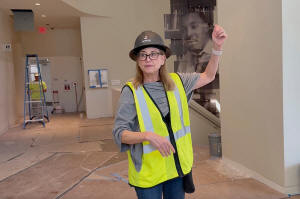The National Center for Civil and Human Rights expands at a critical
moment in US history
[September 15, 2025]
By MICHAEL WARREN
ATLANTA (AP) — A popular museum in Atlanta is expanding at a critical
moment in the United States — and unlike the Smithsonian Institution,
the National Center for Civil and Human Rights is privately funded,
putting it beyond the immediate reach of Trump administration efforts to
control what Americans learn about their history.
The monthslong renovation, which cost nearly $60 million, adds six new
galleries as well as classrooms and interactive experiences, changing a
relatively static museum into a dynamic place where people are
encouraged to take action supporting civil and human rights, racial
justice and the future of democracy, said Jill Savitt, the center's
president and CEO.
The center has stayed active ahead of its Nov. 8 reopening through K-12
education programs that include more than 300 online lesson plans; a
LGBTQ+ Institute; training in diversity, equity and inclusion; human
rights training for law enforcement; and its Truth & Transformation
Initiative to spread awareness about forced labor, racial terror and
other historic injustices.
These are the same aspects of American history, culture and society that
the Trump administration is seeking to dismantle.
Inspiring children to become ‘change agents’
Dreamed up by civil rights icons Evelyn Lowery and Andrew Young, the
center opened in 2014 on land donated by the Coca-Cola Company, next to
the Georgia Aquarium and The World of Coca-Cola, and became a major
tourist attraction. But ticket sales declined after the pandemic.

Now the center hopes to attract more repeat visitors with immersive
experiences like “Change Agent Adventure,” aimed at children under 12.
These “change agents” will be asked to pledge to something — no matter
how small — that “reflects the responsibility of each of us to play a
role in the world: To have empathy. To call for justice. To be fair, be
kind. And that’s the ethos of this gallery,” Savitt said. It opens next
April.
“I think advocacy and change-making is kind of addictive. It’s
contagious," Savitt explained. "When you do something, you see the
success of it, you really want to do more. And our desire here is to
whet the appetite of kids to see that they can be involved. They can do
it.”
This ethos is sharply different from the idea that young people can't
handle the truth and must be protected from unpleasant challenges but,
Savitt said, "the history that we tell here is the most inspirational
history."
"In fact, I think it’s what makes America great. It is something to be
patriotically proud of. The way activists over time have worked together
through nonviolence and changed democracy to expand human freedom —
there’s nothing more American and nothing greater than that. That is the
lesson that we teach here,” she said.
Encouraging visitors to be hopeful
“Broken Promises,” opening in December, includes exhibits from the
post-Civil War Reconstruction era, cut short when white mobs sought to
brutally reverse advances by formerly enslaved people. “We want to start
orienting you in the conversation that we believe we all kind of see,
but we don’t say it outright: Progress. Backlash. Progress. Backlash.
And that pattern that has been in our country since enslavement,” said
its curator, Kama Pierce.
[to top of second column]
|

Jill Savitt, President and CEO of the National Center for Civil and
Human Rights in Atlanta, leads a hard-hat tour of the expanded
museum before its November reopening on Wednesday, Sept. 10, 2025.
(AP Photo/Michael Warren)

On display will be a Georgia historical marker from the site of the
1918 lynching of Mary Turner, pockmarked repeatedly with bullets,
that Turner descendants donated to keep it from being vandalized
again.
“There are 11 bullet holes and 11 grandchildren living,” and the
family's words will be incorporated into the exhibit to show their
resilience, Pierce said.
Items from the Morehouse College Martin Luther King Jr. collection
will have a much more prominent place, in a room that recreates
King's home office, with family photos contributed by the center's
first guest curator: his daughter, the Rev. Bernice King. “We wanted
to lift up King's role as a man, as a human being, not just as an
icon,” Savitt explained.
Gone are the huge images of the world's most genocidal leaders —
Hitler, Stalin and Mao among others — with explanatory text about
the millions of people killed under their orders. In their place
will be examples of human rights victories by groups working around
the world.
“The research says that if you tell people things are really bad and
how awful they are, you motivate people for a minute, and then
apathy sets in because it’s too hard to do anything," Savitt said.
"But if you give people something to hope for that’s positive, that
they can see themselves doing, you're more likely to cultivate a
sense of agency in people.”
Fostering a healthy democracy
And doubling in capacity is an experience many can't forget: Joining
a 1960s sit-in against segregation. Wearing headphones as they take
a lunch-counter stool, visitors can both hear and feel an angry,
segregationist mob shouting they don't belong. Because this is
“heavy content,” Savitt says, a new “reflection area” will allow
people to pause afterward on a couch, with tissues if they need
them, to consider what they've just been through.
The center's expansion was seeded by Home Depot co-founder and
Atlanta philanthropist Arthur M. Blank, the Mellon Foundation and
many other donors, for which Savitt expressed gratitude: “The
corporate community is in a defensive crouch right now — they could
get targeted,” she said.

But she said donors shared concerns about people’s understanding of
citizenship, so supporting the teaching of civil and human rights
makes a good investment.
“It is the story of democracy — Who gets to participate? Who has a
say? Who gets to have a voice?” she said. “So our donors are very
interested in a healthy, safe, vibrant, prosperous America, which
you need a healthy democracy to have.”
All contents © copyright 2025 Associated Press. All rights reserved |